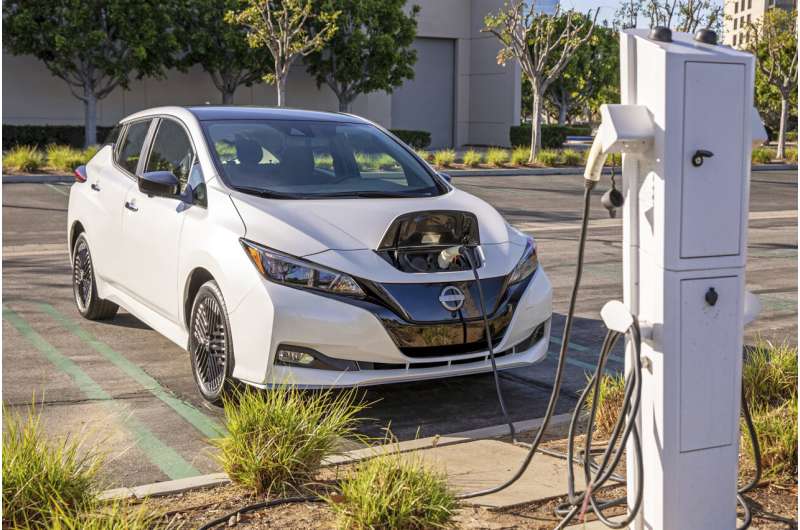Review: 2023 Nissan Leaf vs. 2023 Chevy Bolt EV

Shopper interest in electric vehicles, or EVs, is rising. According to data from the Pew Research Center in 2021, 40% of non-EV owners are very or somewhat likely to purchase an EV as their next vehicle. But many of the latest models are also pricey; a Rivian R1T pickup, for example, starts at more than $70,000 and can easily cost more than $90,000.
Thankfully, there are lower-priced EVs on the market, and two compelling picks are the Nissan Leaf and Chevrolet Bolt EV.
The Nissan Leaf is the pioneering EV for people wanting a low-price zero-emission ride. The 2023 model starts at $28,895 including destination fees, and the Leaf Plus model with a longer driving range has a starting price tag of $36,895.
Chevy has an eye toward value too. The Bolt EV used to cost more than $30,000, but for the 2023 model year, Chevrolet dropped the starting price to $26,595. Even a more well-equipped the Bolt EV 2LT model tops out at around $31,000.
Which one is the better buy? Edmunds car experts compared both EVs to find out.

POWER, DRIVING RANGE AND CHARGING
Budget EVs used to be known for short driving ranges and little power, but that's not completely the case with these rivals. The short-range Leaf S produces 147 horsepower and has an EPA-estimated driving range of 149 miles. Those numbers are unremarkable, but the longer-range SV Plus model packs a more competitive 214-horsepower electric motor and a driving range of 212 miles. Edmunds also ran the Leaf Plus through its real-world range testing and managed to make it 237 miles on a full charge.
The Bolt EV only has one model to choose from, and it boasts 200 horsepower and an EPA-estimated range of 259 miles. It also went farther in Edmunds' real-world testing: 278 miles.
Both EVs can be charged at home or at a public DC-fast charging station. Charging times are similar at home, but when equipped with the larger battery, the Leaf will charge quicker at a fast-charging station. However, the Leaf has an CHAdeMO-style charge port, which may not be supported at all fast-charging stations.
Winner: Bolt EV
TECHNOLOGY AND FEATURES
These budget-friendly EVs come surprisingly well equipped with tech and other features. Both Leaf models have a sizable 8-inch touchscreen and support Apple CarPlay and Android Auto smartphone integration. The base Leaf S comes standard with several advanced driver aids and the SV Plus model adds the ProPilot Assist system, which combines adaptive cruise control and lane centering for easier highway driving. Leather seats or an upgraded audio system aren't offered.
The Bolt EV packs a larger 10.2-inch touchscreen with crisper-looking graphics. The Bolt EV's base 1LT trim comes with fewer driver aids, but the top 2LT trim costs about the same as the base Leaf S and adds more driver aids plus leather seats. It can also be optioned with adaptive cruise control and a Bose audio system for not much more.
Winner: Bolt EV
DRIVING AND COMFORT
Both EVs are zippy around town and boast similar 0-60 mph acceleration. One-pedal driving, which allows you to slow the vehicle down by lifting off the accelerator pedal, can be done in either EV. It can make driving easier and increase range.
In terms of comfort, the Leaf has more supportive front seats than the Bolt, and it offers a smoother ride. The Bolt EV's ride is still pretty comfortable, but unlike the Leaf, rough patches of road and potholes can create a choppy and busy ride. Without loud gasoline engines, you might think road and wind noise is prevalent, but both EVs do a great job keeping outside noise to a minimum.
Winner: Leaf
PASSENGER AND CARGO SPACE
The Leaf and Bolt EV are plenty practical thanks to their hatchback body styles. The biggest difference is cargo space. Behind the rear seats, the Leaf's 23.6 cubic feet of cargo room beats the Bolt EV's 16.6 cubic feet. Passenger room is similar. Head and shoulder room are almost identical in both the front and rear seats, but the Bolt EV offers more front and rear seat legroom. Ultimately, the superior pick here depends on what you need more of.
Winner: tie
EDMUNDS SAYS:
With a starting price lower than the base short-range Leaf S and significantly less than the SV Plus model, the Bolt EV wins this comparison. Potential Bolt buyers may want to wait until 2023 when it will once again be eligible for an EV tax credit up to $7,500 thanks to the Inflation Reduction Act. This makes the Bolt an even more affordable option. But it's not just about the price; the Bolt EV also wins out with its longer driving range and superior infotainment system.
© 2022 The Associated Press. All rights reserved. This material may not be published, broadcast, rewritten or redistributed without permission.




















